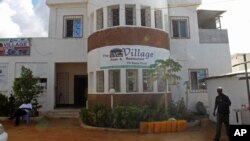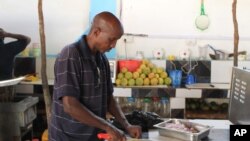Somalis are working to change the image of their country from a war-torn African nation to an attractive destination for foreigners.
Somalia, after decades of unrest, is now slowly opening its doors to business with the international community now that government and African Union (AU) forces have pushed al-Shabab militants from most regions of the country.
Nowhere is the transition more obvious than in Mogadishu. Expatriates are flocking back to the capital with a new vision of the future that includes trendy shops catering to a foreign clientele.
Parliament member Mohammed Amin Osman says the capital is undergoing a transformation.
"Now, business, hotels, restaurants have started opening, roads are building, schools are building so now, a lot of hope are [is] there," he said.
Ahmed Jama recently left Britain and returned to his native Somalia where he is opening two Western-style restaurants in hotels that he owns in Mogadishu.
Jama says he is using the skills he acquired in Britain to help Somalia prosper.
"The motivation is that this time, it is the time for pay back," he said. "We have been learning in Britain to develop and show them we can rebuild the country."
Returning expatriate Deka Cantar Abdikarin says the prospect of political stability prompted his return to Mogadishu.
"There's a lot of people coming back here now. It's probably the safest time to be in Somalia and it is a very exciting time because of the elections," Abdikarin said. "There is a lot going on. People are here to rebuild again and to bring our country back together."
Somalia has not had a stable central government since former dictator Mohamed Siad Barre was toppled in 1991. However, plans are underway for the east African nation to establish a new government and elect a new president by August 20.
Osman says the biggest challenges for the new government will be establishing security, a working administration and development.
Although weakened, al-Shabab remains a constant threat. The militant group claimed responsibility for a May assassination attempt on President Sheikh Sharif Sheikh Ahmed.
Despite the continued unrest, the country is moving ahead with plans to forge alliances with the international community.
It has received strong backing from Turkey, which hosted an international conference on Somalia this month. Istanbul has also poured more than $360 million in cash and aid into Somalia over the past year.
During the two-day conference in Turkey, Somalia's transitional Prime Minister Abdiweli Mohamed Ali outlined his vision for the country's future. He said he envisioned a "East African Economic Zone" that includes Somalia.
Somalia, after decades of unrest, is now slowly opening its doors to business with the international community now that government and African Union (AU) forces have pushed al-Shabab militants from most regions of the country.
Nowhere is the transition more obvious than in Mogadishu. Expatriates are flocking back to the capital with a new vision of the future that includes trendy shops catering to a foreign clientele.
Parliament member Mohammed Amin Osman says the capital is undergoing a transformation.
"Now, business, hotels, restaurants have started opening, roads are building, schools are building so now, a lot of hope are [is] there," he said.
Ahmed Jama recently left Britain and returned to his native Somalia where he is opening two Western-style restaurants in hotels that he owns in Mogadishu.
Jama says he is using the skills he acquired in Britain to help Somalia prosper.
"The motivation is that this time, it is the time for pay back," he said. "We have been learning in Britain to develop and show them we can rebuild the country."
Returning expatriate Deka Cantar Abdikarin says the prospect of political stability prompted his return to Mogadishu.
"There's a lot of people coming back here now. It's probably the safest time to be in Somalia and it is a very exciting time because of the elections," Abdikarin said. "There is a lot going on. People are here to rebuild again and to bring our country back together."
Somalia has not had a stable central government since former dictator Mohamed Siad Barre was toppled in 1991. However, plans are underway for the east African nation to establish a new government and elect a new president by August 20.
Osman says the biggest challenges for the new government will be establishing security, a working administration and development.
Although weakened, al-Shabab remains a constant threat. The militant group claimed responsibility for a May assassination attempt on President Sheikh Sharif Sheikh Ahmed.
Despite the continued unrest, the country is moving ahead with plans to forge alliances with the international community.
It has received strong backing from Turkey, which hosted an international conference on Somalia this month. Istanbul has also poured more than $360 million in cash and aid into Somalia over the past year.
During the two-day conference in Turkey, Somalia's transitional Prime Minister Abdiweli Mohamed Ali outlined his vision for the country's future. He said he envisioned a "East African Economic Zone" that includes Somalia.





